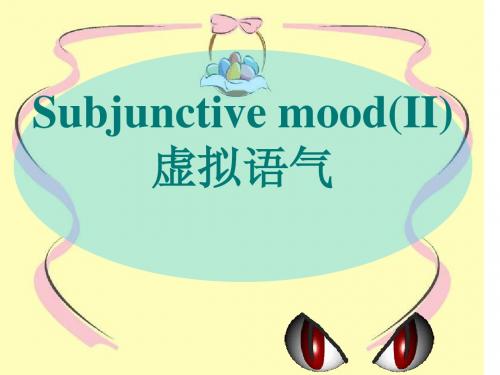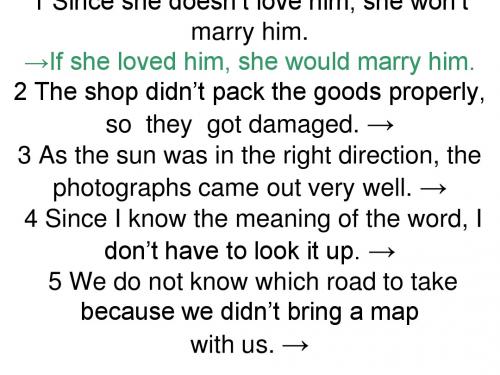虚拟语气2
- 格式:doc
- 大小:83.50 KB
- 文档页数:43


德语虚拟语气第二虚拟式总结一、表达假设和条件的情况:1.客观条件假设:如果句子的条件部分与现实相符,虚拟语气使用第一虚拟式;如果条件部分与现实相反,虚拟语气使用第二虚拟式。
例如:-如果我有时间,我就去你家。
- Wenn ich Zeit hätte, würde ich zu dir kommen.2.主观条件假设:当句子表达的条件是与说话人主观判断有关的情况时,虚拟语气使用第二虚拟式。
例如:-如果我是你,我就不买那件衣服。
- Wenn ich du wäre, würde ich das Kleid nicht kaufen.二、表达愿望和建议的情况:1.表达愿望:使用"ich hoffe", "ich wünsche mir", "ich hätte gern"等表达愿望的动词,后跟虚拟语气的第二虚拟式。
例如:-我希望我能和你一起去旅行。
- Ich hoffe, dass ich mit dir verreisen könnte.2.表达建议:使用"ich würde vorschlagen"、"es wäre besser"等表达建议的句型时,后跟虚拟语气的第二虚拟式。
例如:-我建议你明天早点来。
- Ich würde vorschlagen, dass du morgen früher kommst.三、其他用法:1. 与"dürfen"连用,表示礼貌的建议或请求。
例如:- Du dürftest besser das Fenster schließen.-你最好关上窗户。
2. 表达抱怨或愤怒的情绪,通常通过"es ist schade"或"es ist unzufrieden"等表达方式。

【英语学习方法】英语语法虚拟语气2虚拟语气(Subjunctive Mood)这一语法项目是各类英语考试中心测试的重点之一。
虚拟语气是一种特殊的动词形式,用来表示说话人所说的话并不是事实,而是一种假设、愿望、怀疑或推测。
判断是真实条件句还是非真实条件句。
只有在非真实条件句中才使用虚拟语气。
通过句子意思,看假设的条件是否能够实现,能够实现是真实条件句,不能使用虚拟语气;假设的条件不能实现则是非真实条件句,要用虚拟语气.判断这个假设是与哪个事实相反。
通常有三种情况:①与过去事实相反。
②与现在事实相反。
③与将来事实可能相反I: 最基本的虚拟语气句型:1. 虚拟现在时表示与现在事实相反的假设,其if 从句的谓语形式用动词的过去式(be 一般用were),主句用would/ should/ could/ might 动词原形。
If places were a like, there would be little need for geographers.如果各个地方都一样,就不需要地理学家了。
2. 虚拟过去时是表示与过去事实相反的假设,if 从句的谓语形式用过去完成时即had+过去分词,主句用would / should / could / might have 过去分词。
If he had known your address yesterday,he would have telephoned you.3. 虚拟将来时是表示对将来实现的可能性很小的或不确定的假设。
If从句的谓语形式用一般过去式或用were to / should 动词原形,主句用would / should/could/ might 动词原形。
If he were to leave today, he would get there by Friday4. 省略if 采用倒装语序的条件句。
有时可以把含有助动词、情态动词、be或have 的虚拟条件句中的连词if省去,而将had , should, were 等词提到主语之前,即用倒装结构。



虚拟语气The subjunctive mood1. 概念虚拟语气用来表示说话人的主观愿望或假想,所说的是一个条件,不一定是事实,或与事实相反。
2. 在条件句中的应用条件句可分为两类,一类为真实条件句一类为非真实条件句。
非真实条件句表示的是假设的或实际可能性不大的情况,故采用虚拟语气。
2.1 真实条件句真实条件句用于陈述语气,假设的情况可能发生,其中if 是如果的意思。
时态关系句型:If he comes, he will bring his violin.典型例题The volleyball match will be put off if it ___.A. will rainB. rainsC. rainedD. is rained答案B。
真实条件句主句为将来时,从句用一般现在时。
注意:1)在真实条件句中,主句不能用be going to表示将来,该用shall, will.(错) If you leave now, you are never going to regret it. (对) If you leave now, you will never regret it.2)表示真理时,主句谓语动词便不用shall (will) +动词原形,而直接用一般现在时的动词形式。
If you leave now, the earth still travels around the sun.步骤:先判断该句子是真实还是非真实如是非真实,判断其是与现在事实相反,还是过去,将来。
2.2 非真实条件句1)时态:可以表示过去,现在和将来的情况。
它的基本特点是时态退后。
a.同现在事实相反的假设时态关系:句型:If they ____(be) here, they ____(help) you.b.表示于过去事实相反的假设时态关系:句型:1)If she had worked harder,she would have succeeded. 2)The rice would not have been burnt if you had been more careful.3)If my lawyer had been here last Saturday, he would have prevented me from going.4)If he had come yesterday, Ishould / would have told him about it.含义:He did not come yesterday, so I did not tell him about it.5)If he had not been ill and missed many classes, he would have made greater progress.含义:He was ill and missed many lessons, so he did not make greater progress.c.表示对将来的假想句型:E.g.1) If you succeeded, everything would be all right.2) If you should succeed,everything would be all right.3) If you were to succeed, everything would be all right.3. 混合条件句主句与从句的动作发生在不同的时间,这时主,从句谓语动词的虚拟语气形式因时间不同而不同,这叫做混合条件句。
If you had asked him yesterday, you would know what to do now.(从句与过去事实相反,主句与现在事实相反。
)If it had rained last night (过去), it would be very cold today (现在).4. 虚拟条件句的倒装虚拟条件句的从句部分如果含有were, should, 或had, 可将if省略,再把were, should或had 移到从句句首,实行倒装。
1)W ere they here now, they could help us.=If they were here now, they could help us.2)Had you come earlier, you would have met him=If you had come earlier, you would have met him.注意:在虚拟语气的从句中,动词'be'的过去时态一律用"were",不用was,即在从句中be用were代替。
If I were you, I would go to look for him.If he were here, everything would be all right.典型例题_____ to do the work, I should do it some other day. A. If were I B. I wereC. Were ID. Was I答案 C. 在虚拟条件状语中如果有were, should, had这三个词,通常将if省略,主语提前, 变成were, should, had +主语的形式。
但要注意,在虚拟条件状语从句中,省略连词的倒装形式的句首不能用动词的缩略形式。
如我们可说W ere I not to do., 而不能说W eren't I to do.5. 特殊的虚拟语气词:should1)It is demanded / suggested/important/necessary / a pity + that…结构中的主语从句的谓语动词要用should 加动词原形,should 可省略。
结构常用词:(1)suggested, ordered, proposed, required, demanded, requested, insisted;+ (should) do (2)important, necessary, natural, strange,a pity, a shame,no wonder+ (should) doE.g. It is suggested that we (should) hold a meeting next week.It is necessary that he (should) come to our meeting tomorrow.2)在宾语从句中的应用在表示命令、建议、要求等一类动词后面的从句中。
order, suggest, propose, require, demand, request,insist, command, insist + (should) doI suggest that we (should) hold a meeting next week.He insisted that he (should ) be sent there.注意:如suggest, insist不表示"建议" 或"坚持要某人做某事时",即它们用于其本意"暗示、表明"、"坚持认为"时,宾语从句用陈述语气。
判断改错:( )You pale face suggests that you (should) be ill. ( ) Your pale face suggests that you are ill.( ) I insisted that you ( should) be wrong.( )I insisted that you were wrong.3)在表语从句,同位语从句中的应用在suggestion, proposal, idea, plan, order, advice等名词后面的表语从句、同位语从句中要用虚拟语气,即(should)+动词原形。
My idea is that we (should) get more people to attend the conference.I make a proposal that we (should) hold a meeting next week.6. wish的用法1)wish后面的从句表示与事实相反的情况,或表示将来不太可能实现的愿望。
其宾语从句的动词形式为:现在wish 后过过去wish 后过去完成时将来wish 后would/could/+动词原形I wish I were as tall as you.我希望和你一样高。
He wished he hadn't said that. 他希望他没讲那样的话。
I wish it would rain tomorrow. 我希望明天下雨就好了。
7. 比较if only与only if only if表示"只有";if only则表示"如果……就好了"。
Ifonly也可用于陈述语气。
I wake up only if the alarm clock rings.只有闹钟响了,我才会醒。
If only the alarm clock had rung.当时闹钟响了,就好了。
If only he comes early.但愿他早点回来。
8. It is (high) time thatIt is (high) time that 后面的从句谓语动词要用过去式或用should加动词原形,但should不可省略。
It is time that the children went to bed.It is high time that the children should go to bed.9.need "不必做"和"本不该做"didn't need to do表示:过去不必做某事, 事实上也没做。
.needn't have done表示:过去不必做某事, 但事实上做了。
John went to the station with the car to meet Mary, so she didn't need to walk back home.约翰开车去车站接玛丽,所以她不必步行回家了。
John went to the station with the car to meet Mary, so she needn't have walked back home.约翰开车去车站接玛丽,所以她本不必步行回家了。